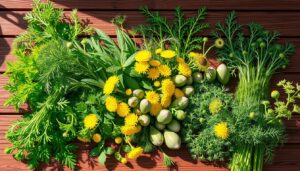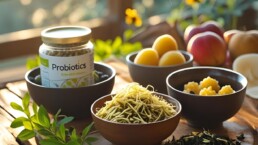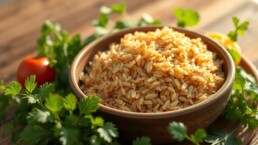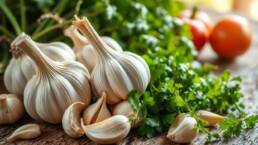Beyond its delicate, feathery charm and refreshing zest in your favorite dishes, lies a powerhouse of wellness! For over 5,000 years, dill has been more than just a flavorful herb. This comprehensive guide, filled with Dr. Good Deed’s expert tips, unveils the amazing health benefits of dill weed, seeds, and dried dill . From soothing digestion and easing discomfort to potentially supporting hormonal balance and packing an antioxidant punch, prepare to discover 13 compelling reasons why incorporating this ancient herb into your daily routine can be a surprisingly potent boost to your overall well-being.
Table of Contents
ToggleFrom easing digestion to supporting reproductive health, the health benefits of dill weed , seeds, and dried dill are remarkable and well worth exploring. In this article, we’ll break down 13 powerful ways dill supports your overall well-being.
A Quick History of Dill
Dill has deep roots in ancient civilizations, from Egypt and Greece to Babylon. The Egyptians called it a “soothing medicine,” while the Greeks and Romans used it for culinary and medicinal purposes. Today, it’s used globally in salads, sauces, teas, and pickles—and it’s known for more than just its taste.
European vs. Indian Dill

While both types of dill come from the same plant family, they differ slightly:
- European dill is rich in carvone, a compound responsible for its sweet aroma.
- Indian dill contains more apiole, a compound linked to reproductive health and traditional remedies.
No matter which type you use, the health benefits of dill weed remain impressive across the board.
Nutritional Highlights
Dill is low in calories but dense in nutrients. A small serving provides important vitamins and minerals that support many of your body’s systems.
Nutritional Snapshot:
- Fresh Dill (1 cup / 9g):
- 4 calories
- 8% Daily Value (DV) of Vitamin C
- 5% DV of Manganese
- 4% DV of Vitamin A
- 3% DV of Folate
- 3% DV of Iron
- Dill Seeds (1 tbsp / 6.6g):
- 8% DV of Calcium
- 6% DV of Iron
- Trace minerals: magnesium, manganese, phosphorus, potassium
Key Nutrients:
- Vitamin A : Essential for vision, immunity, and reproductive health
- Vitamin C : Supports immunity, wound healing, and collagen production
- Calcium & Iron : Crucial for bones, blood production, and energy metabolism
These nutrients are a big part of why the health benefits of dill weed are so widely celebrated.
1. Supports Healthy Digestion
Dill acts as a natural carminative—it helps relieve gas and bloating. Its essential oils encourage bile flow and improve digestive efficiency. Drinking dill tea or chewing dill seeds can be especially helpful after heavy meals.
2. Reduces Flatulence and Stomach Discomfort
Studies show dill extract helps reduce acidity and protect the stomach lining. It may also inhibit Helicobacter pylori , the bacteria linked to ulcers and gastritis. This makes dill a natural ally for those with digestive sensitivities.
3. Protects Against Stomach Ulcers
Dill contains flavonoids and terpenes that help guard the stomach against excess acid and inflammation. Drinking dill water or tea regularly may help reduce symptoms like cramps, diarrhea, and nausea.
4. Relieves Menstrual Cramps
One of the traditional health benefits of dill weed lies in its ability to soothe menstrual pain. Dill seed extracts work similarly to over-the-counter pain relievers by relaxing muscles and blood vessels, easing discomfort.
5. May Help Regulate Menstrual Cycles
Indian dill has long been used to promote regular periods. Its emmenagogue properties help stimulate menstrual flow, making it a natural option for those with irregular cycles.
6. Eases Labor Pain and May Enhance Breast Milk Production
Though more research is needed, early studies suggest dill may reduce the intensity of labor pain. Some traditional practices also use dill to support milk production in breastfeeding mothers.
7. Acts as a Natural Antioxidant
Dill is rich in antioxidants like vitamin C, beta-carotene, quercetin, and kaempferol. These compounds fight free radicals, reducing oxidative stress and potentially lowering the risk of chronic diseases.
8. Helps Reduce Inflammation
Dill’s monoterpenes, such as carvone and limonene, have been shown to interact with anti-inflammatory enzymes in the body. Regular use of dill in cooking may help reduce inflammation markers linked to heart disease and arthritis.
9. Fights Bacterial and Fungal Infections
Dill essential oil has antimicrobial properties that fight common pathogens like E. coli , Staphylococcus aureus , and Candida albicans . This makes dill helpful in supporting immune health and gut balance.
10. May Support Cholesterol Management
Animal studies suggest dill can help lower LDL (bad) cholesterol and triglycerides while supporting liver function. Although human trials are limited, these findings highlight dill’s potential for cardiovascular support.
11. Boosts Heart and Metabolic Health
The flavonoids and minerals in dill may help improve blood flow, regulate blood sugar, and reduce blood pressure—factors important for both heart and metabolic health.
12. Rich in Vitamins and Minerals
The health benefits of dill weed stem largely from its dense nutritional profile. Just 100 grams of fresh dill gives:
- 154% DV of Vitamin A
- 142% DV of Vitamin C
- 38% DV of Folate
- 17% DV of Riboflavin
It also contains good amounts of calcium, magnesium, phosphorus, potassium, and manganese.
13. Culinary Versatility Enhances Its Health Benefits
Dill’s flavor makes it easy to incorporate into meals:
- Dill weed : Great for garnishing soups, salads, and yogurt sauces. Add it at the end of cooking to preserve aroma.
- Dill seeds : Ideal for stews, pickling, and longer cooking processes.
You can use dill in everything from salad dressings and soups to baked breads and seafood dishes. The more often you include it in your cooking, the more you enjoy the health benefits of dill weed .
Final Thoughts
Whether you’re using fresh dill, dried dill, or dill seeds, this herb offers a host of wellness advantages. From better digestion and menstrual relief to antioxidant protection and possible cholesterol-lowering effects, the health benefits of dill weed are vast and supported by both tradition and emerging science.
Adding dill to your daily routine is an easy, flavorful way to enhance your diet—and your health.
Frequently Asked Questions (FAQ)
Does dill weed have any health benefits?
Yes, dill weed offers several health benefits. It aids digestion, eases menstrual cramps, supports immunity, and provides essential nutrients.
Is dill good for your stomach?
Absolutely. Dill helps reduce bloating, relieves indigestion, and protects the stomach lining from excess acid.
Can you boil dill and drink it?
Yes, dill tea is a traditional remedy. Boiling dill seeds or leaves in water makes a soothing drink for stomach or menstrual discomfort.
Who should not eat dill?
People allergic to dill or with certain hormonal conditions should consult their doctor before consuming large amounts or supplements.
What nutrients are found in dill?
Dill is rich in vitamin A, vitamin C, calcium, iron, and powerful plant antioxidants like flavonoids and monoterpenes.
What is dill mostly used for?
It’s widely used in pickling, cooking, and herbal teas. It pairs well with seafood, potatoes, and creamy sauces.
Is dill safe during pregnancy?
Moderate use in food is generally safe, but high doses or concentrated dill supplements should be avoided unless advised by a doctor.

This article is medically reviewed by Dr. Chandril Chugh, Board-Certified Neurologist, providing expert insights and reliable health information.
Dr. Chandril Chugh is a U.S.-trained neurologist with over a decade of experience. Known for his compassionate care, he specializes in treating neurological conditions such as migraines, epilepsy, and Parkinson’s disease. Dr. Chugh is highly regarded for his patient-centered approach and dedication to providing personalized care.








